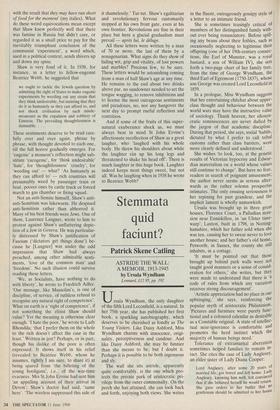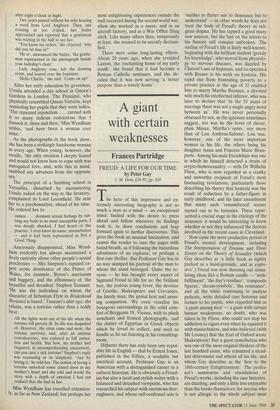Stemmata quid faciunt?
Patrick Skene Catling
ASTRIDE THE WALL: A MEMOIR, 1913-1945 by Ursula Wyndham
Lennard, £12.95, pp. 192
Ursula Wyndham, the only daughter of the fifth Lord Leconfield, is a natural. In her 75th year, she has published her first book, a sparkling autobiography, which deserves to be cherished as fondly as The Young Visiters. Like Daisy Ashford, Miss Wyndham charms with innocence, origi- nality, perceptiveness and candour. And like Daisy Ashford, she may be funnier than she means to be, but I doubt it. Perhaps it is possible to be both ingenuous and sly.
The wall she sits astride, apparently quite comfortably, is the one which pro- tects the private park of aristocratic pri- vilege from the outer commonalty. On the perch she has attained, she can look back and forth, enjoying both views. She writes in the fluent, outrageously gossipy style of a letter to an intimate friend.
She is sometimes teasingly critical of members of her distinguished family with- out ever being renunciatory. Before spill- ing any beans about their foibles, such as occasionally neglecting to legitimise their offspring (one of her 19th-century connec- tions, the Earl of Munster, was a royal bastard, a son of William IV), she sets forth a two-page chart of her family tree, from the time of George Wyndham, the third Earl of Egremont (1750-1837), whose son George was created Lord Leconfield in 1859.
In a prologue, Miss Wyndham suggests that her entertaining chitchat about upper- class thought and behaviour between the world wars may have the instructive value of sociology. Thank heaven, her idiosyn- cratic reminiscences are never dulled by the jargon of that academic discipline. During that period, she says, social 'habits, dictated by what I prefer to call tribal customs rather than class barriers, were more clearly defined and understood.' She wishes `to look, too, at the genetic results of Victorian hypocrisy and Edwar- dian materialism on a world whose values still continue to change'. But have no fear, readers in search of poignant amusement; the author never seems as serious after- wards as the rather solemn prospectus intimates. The only ensuing seriousness is her repining for past grandeur, and the implicit lament is wholly unmawkish. Ursula was brought up in three great houses, Florence Court, a Palladian man- sion near Enniskillen, in 'an Ulster time warp'; Laxton, built in 1798, in Notting- hamshire, which her father sold when she was ten, causing her to swear never to love another house; and her father's old home, Petworth, in Sussex, the county she still inhabits, in a cottage.
'It must be pointed out that those brought up behind park walls were not taught good manners or a sense of consid- eration for others,' she writes, but they were made to understand that there is 'a code of rules from which any variation receives strong discouragement'.
'Artistic appreciation had no place in our upbringing,' she says, reinforcing the popular myth of aristocratic Philistinism. 'Pictures and furniture were purely func- tional and a coloured calendar as desirable as a Constable original. A state of intellec- tual near-ignorance is comfortable and promotes the herd instinct which the majority of human beings need.' Tolerance of extramarital aberration sometimes helped families to remain in- tact. She cites the case of Lady Anglesey, an elder sister of Lady Diana Cooper:
Lord Anglesey, after some 20 years of married life, got bored and left home. Lady Anglesey, knowing him well, felt convinced that if she behaved herself he would return. She gave orders to her butler that no gentleman should be admitted to her house
after eight o'clock at night.
Two years passed without his wife hearing a word from Lord Anglesey. Then, one evening at ten o'clock, her butler approached and reported that a gentleman was waiting in the hall to see her.
'You know my orders,' she objected, 'why did you let him in?'
'He is', announced the butler, 'the gentle- man represented in the photograph beside your ladyship's chair.'
Lady Anglesey rose, left the drawing room, and leaned over the banisters. 'Hello Charlie,' she said. 'Come on up!'
After her early education by governess, Ursula attended a day school in Queen's Gardens in London. The Principal, who Physically resembled Queen Victoria, kept reminding her pupils that they were ladies. The repeated injunction . . . carried with a so many tedious restrictions that I forsook it, there and then,' Miss Wyndham writes, 'and have been a woman ever since.'
As the photographs in the book show, she has been a strikingly handsome woman at every age. When young, however, she recalls, 'the only emotion I deeply feared and would not know how to cope with was unrequited love, and, with this in mind, snubbed any advances from the opposite sex.'
The principal of a finishing school in Versailles, disturbed by encountering Ursula naked on the way to the lavatory, complained to Lord Leconfield. He sent her to a psychoanalyst, ahead of his time. He ordered her to
induce . . . dormant sexual feelings by rub- bing my body in its most susceptible parts. I was deeply shocked. I had heard of this practice. I even knew its name: masturbation — and it had been represented as Not a Good Thing.
Amorously disappointed, Miss Wynd- ham evidently has always maintained a lively curiosity about other people's sexual proclivities — Mrs Simpson's reputed ex- pert erotic dominance of the Prince of Wales, for example, Byron's narcissism and buggery, and the effeminacy of 'the beautiful and decadent' Stephen Tennant. 'He was the individual on whom the character of Sebastian Flyte in Brideshead Revisited is based.' Tennant's alter ego, she relates, was a tortoise rather than a teddy bear.
All the lights went out of his life when the tortoise fell gravely ill. Its life was despaired of. However, the crisis came and went, the tortoise survived, and, after an anxious convalescence, was restored to full anima- tion and health. But how, my mother had enquired, in uncomprehending amazement, can you cure a sick tortoise? Stephen's reply was reassuring in its simplicity. 'Just by loving it,' he told her. The notion of loving a tortoise unlocked some closed door in my mother's heart and she told and retold the story with a depth of emotion I had not realised that she had in her.
Miss Wyndham has travelled extensive- ly, as far as New Zealand; but perhaps her most enlightening experiences outside the wall occurred during the second world war, when she worked as a nurse, and in an aircraft factory, and as a War Office filing clerk. Like many others then, temporarily at least, she seemed to be socially declassi- fied.
There were some long-lasting effects. About 20 years ago, when she revisited Laxton, the 'enchanting home of my early youth', she found that it had become a Roman Catholic seminary, and she de- cided that it was now serving 'a better purpose than a stately home'.



































































 Previous page
Previous page